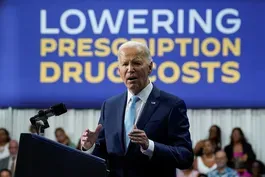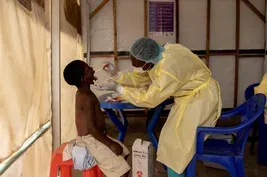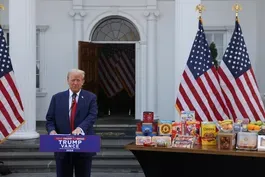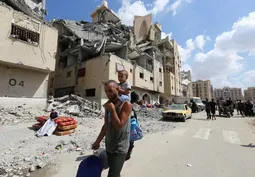
U.S. official: Gaza cease-fire key to preventing wider war
Clip: 8/15/2024 | 2m 38sVideo has Closed Captions
U.S. official says Gaza cease-fire talks will continue, deal key to preventing wider war
The Gaza war reached a staggering milestone with the Hamas-run health ministry reporting 40,000 Gazans have been killed since Hamas attacked Israel on Oct. 7. It comes as negotiators met again in Qatar to try and find a path toward a cease-fire, which the U.S. believes is the best way to prevent the war in Gaza from expanding to an even larger regional conflict. Nick Schifrin reports.
Problems with Closed Captions? Closed Captioning Feedback
Problems with Closed Captions? Closed Captioning Feedback
Major corporate funding for the PBS News Hour is provided by BDO, BNSF, Consumer Cellular, American Cruise Lines, and Raymond James. Funding for the PBS NewsHour Weekend is provided by...

U.S. official: Gaza cease-fire key to preventing wider war
Clip: 8/15/2024 | 2m 38sVideo has Closed Captions
The Gaza war reached a staggering milestone with the Hamas-run health ministry reporting 40,000 Gazans have been killed since Hamas attacked Israel on Oct. 7. It comes as negotiators met again in Qatar to try and find a path toward a cease-fire, which the U.S. believes is the best way to prevent the war in Gaza from expanding to an even larger regional conflict. Nick Schifrin reports.
Problems with Closed Captions? Closed Captioning Feedback
How to Watch PBS News Hour
PBS News Hour is available to stream on pbs.org and the free PBS App, available on iPhone, Apple TV, Android TV, Android smartphones, Amazon Fire TV, Amazon Fire Tablet, Roku, Samsung Smart TV, and Vizio.
Providing Support for PBS.org
Learn Moreabout PBS online sponsorshipAMNA NAWAZ: Welcome to the "News Hour."
In Gaza today, the war reached a staggering milestone.
The Hamas-run Gaza Health Ministry says 40,000 Gazans have been killed since Hamas attacked Israel on October 7.
It comes in yet another fraught moment for the region.
Negotiators met again in Qatar to try and find a path toward a Gaza cease-fire, which the U.S. believes is the best way to prevent the war in Gaza from expanding to an even larger regional conflict.
For more, Nick Schifrin is here now.
He's been following both stories.
Nick, let's just begin with the negotiations.
How close are the two sides to a deal?
NICK SCHIFRIN: A U.S. official told me tonight that the talks were -- quote -- "constructive" and would continue tomorrow and that the mediators were discussing the implementation of the deal, rather than debating the framework.
But I spoke to a regional official involved in the talks, Amna, and this official said the two sides were entrenched and the talks were difficult.
The framework that we're talking about overall remains the same, a six-week cease-fire, an initial release of more than 30 prisoners, the female, elderly, and the infirm.
Israel would release an initial 700 Palestinian detainees, including those convicted of terrorism, and Israel would allow -- quote -- "the surge of humanitarian aid."
But over the last month, regional and Israeli officials tell me that Israel has focused a few points that are now being debated, number one, the Philadelphi Corridor between Gaza and Egypt.
Israel says that it must now control that corridor.
Number two, checkpoints that would screen Gazans moving from Southern to Northern Gaza to prevent Hamas fighters' movement.
Number three, all 30 hostages must be released, initially, must be alive.
It's not clear that Hamas can actually deliver that.
And which Palestinian prisoners Israel can refuse to release.
Now, National Security Council spokesman John Kirby said before the talks began that the two sides had narrowed the gaps.
But, again, that regional official telling me tonight Hamas says it's already made concessions and it's not willing to make anymore.
AMNA NAWAZ: Nick, you have been reporting on the starts and stops in these talks.
Just remind us, why are they still critical now?
NICK SCHIFRIN: As you said at the top, U.S. officials believe that a cease-fire is key to preventing regional expansion.
They believe that, if there is a cease-fire, Iran might not respond with an attack on Israel via Iran or its proxies to two assassinations in Beirut and Tehran.
If there's a cease-fire, that would reduce the chances of any kind of Hezbollah-Israel war as well on Israel's northern border.
But the principal goal, of course, is to stop the war in Gaza, which started after Hamas' October 7 terrorist attack, the deadliest day in Israeli history.
Biden strikes deal to reduce Medicare prescription prices
Video has Closed Captions
Clip: 8/15/2024 | 6m 42s | Biden administration strikes deal to cut prices on some of Medicare's costliest drugs (6m 42s)
Epidemiologist breaks down how and where mpox is spreading
Video has Closed Captions
Clip: 8/15/2024 | 5m 14s | Epidemiologist breaks down how and where mpox is spreading (5m 14s)
Fact-checking the latest campaign claims from Trump, Harris
Video has Closed Captions
Clip: 8/15/2024 | 7m 42s | Fact-checking the latest campaign trail claims from Trump and Harris (7m 42s)
Gazan families shattered as war's death toll crosses 40,000
Video has Closed Captions
Clip: 8/15/2024 | 8m 26s | Gazan families shattered as war's death toll crosses 40,000 (8m 26s)
How popular European destinations are deterring tourists
Video has Closed Captions
Clip: 8/15/2024 | 7m 57s | How some popular European destinations are trying to deter tourists from pouring in (7m 57s)
James Baldwin's enduring influence on art and activism
Video has Closed Captions
Clip: 8/15/2024 | 7m 49s | A look at James Baldwin's enduring influence on art and activism (7m 49s)
Providing Support for PBS.org
Learn Moreabout PBS online sponsorshipSupport for PBS provided by:
Major corporate funding for the PBS News Hour is provided by BDO, BNSF, Consumer Cellular, American Cruise Lines, and Raymond James. Funding for the PBS NewsHour Weekend is provided by...

















